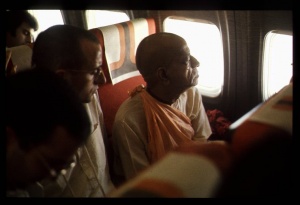CC Madhya 23.25 (1975)

A.C. Bhaktivedanta Swami Prabhupada
Below is the 1996 edition text, ready to be substituted with the 1975 one using the compile form.
TEXT 25
- yo dustyajān dāra-sutān
- suḥṛd-rājyaṁ hṛdi-spṛśaḥ
- jahau yuvaiva mala-vad
- uttamaḥśloka-lālasaḥ
SYNONYMS
yaḥ—who (Bharata Mahārāja); dustyajān—difficult to give up; dāra-sutān—wife and children; suhṛt—friends; rājyam—kingdom; hṛdi-spṛśaḥ—dear to the core of the heart; jahau—gave up; yuvā—youthful; eva—at that time; mala-vat—like stool; uttamaḥ-śloka-lālasaḥ—being captivated by the transcendental qualities, pastimes and association of the Supreme Personality of Godhead.
TRANSLATION
“‘King Bharata was very eager to attain the association of the Supreme Personality of Godhead, Kṛṣṇa, who is called Uttamaḥśloka because poems and prayers are offered to Him for His favor. In his youth, King Bharata gave up his attractive wife and children, as well as his beloved friends and opulent kingdom, just as one gives up stool after passing it.’
PURPORT
These are the signs of virakti (detachment) found in a person who has developed bhāva, the preliminary stage of love of Godhead. This verse is quoted from Śrīmad-Bhāgavatam (SB 5.14.43).